|
Children
of Bond - The Dirty Harry Series
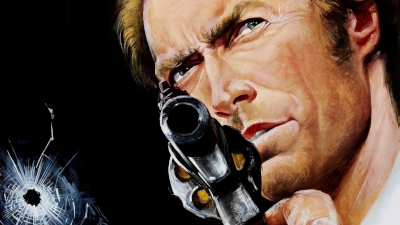
Inspector Harry
Callahan. Leather elbows on a tweed jacket, misanthropic sardonic
disdain for the world (especially criminals of course), less than
perfect relationship with his superiors ("Hey, Callahan, want me to
print that in braille and shove it up your ass?"), attitude problem,
prone to property damage, Smith & Wesson .44 Magnum - "The most
powerful handgun in the world, and would blow your head clean off!"
Whether blowing up some terrorist hippies with a rocket launcher or
foiling an armed bank robbery while still munching on his hot dog it's
all in a day's work for "Dirty" Harry Callahan of the San Francisco
Police Department.
The Dirty Harry
series consists of five films ranging from 1971 to 1988. Dirty Harry,
Magnum Force, The Enforcer, Sudden Impact, The Dead Pool. The first two
films are very good and while the others are not so memorable the gruff
charisma of Eastwood makes them all just about worth watching. These
films are violent but very funny in places. The three pictures set in
the funky seventies work best I think and the first one in particular
was hugely influential, spawning a new genre and inspiring a slew of
copycats. This is the closest we've had to a sort of American style
Bond series I think and although the characters are very different on
the face of it you pick up a surprising amount of influences from the
Bond series when you watch these films. Some of the scenes in
particular where Eastwood visits the weapons department in the police
station are clearly inspired by Bond visiting Q.
1971's Dirty Harry
was directed by Don Siegel and written by Harry Julian Fink, RM Fink,
and Dean Reisner with additional input by John Milius. Milius is
credited with coming up with some of the most famous and iconic
dialogue flourishes including the most oft-quoted line of all during
the bank robbery street sequence. This is the best film in the series
and the one that feels the most downbeat and serious - the series (like
Bond you might argue) becoming increasingly parodic and knowing as it
went on. Dirty Harry is a violent and seminal police thriller with
stylish direction and an eerie psychedelic jazz score by Lalo Schifrin
that proves to be a great compliment to the extensive San Francisco
locations. Lot of wonderful swooping helicopter shots in this film that
not only show you the city but emphasise the lonesome image of Callahan
as a man who stands apart and alone.
Harry Callahan
(Clint Eastwood obviously) is an Inspector with the San Francisco
Police Homicide Department and has earned the soubriquet "Dirty" Harry
for reasons that are never completely clarified but seem to be because
he gets all the tasks no one else wants to do. "No wonder they call him
Dirty Harry; he always gets the s*** end of the stick." The
monosyllabic and sarcastic Callahan is considered to have what you
could term anti-social and politically incorrect attitudes by his
bosses and is known as a man who shoots first and worries about the
consequences later. This is liberal hippy trippy San Francisco but
Harry thinks that bureaucracy has got out of control and the courts are
too soft on criminals and not thinking about the victims.
Callahan's
unconventional (and brutal) methods and the ability of his exasperated
bosses to control him are about to be put to the test though in severe
fashion. A very nasty and oleaginous psychopathic serial killer known
as Scorpio (Andrew Robinson) murders a young woman in a swimming pool
using a high powered telescopic rifle from a rooftop and demands a huge
ransom be paid or the city will suffer more murders. A vicious game of
cat and mouse between Callahan and Scorpio unfolds with Harry often
feeling like he is battling city red tape and legal procedures as much
as he is the killer. "Where does it say you've got the right to kick
down doors, torture suspects, deny medical attention and legal
counsel?"
Dirty
Harry is of course a role that Clint Eastwood was born to play but like
many famous films it was all a fortuitous accident. The film was
written with John Wayne in mind but he decided that Harry Callahan was
the type of character he'd played far too often (a decision he later
deeply regretted when he saw how successful the film was). Burt
Lancaster, Robert Mitchum, Steve McQueen and Paul Newman all turned the
film down before Frank Sinatra was cast as Callahan but bailed out when
he hurt his hand filming The Manchurian Candidate and decided he wanted
to do something lighter anyway.
Warner Brothers
then turned to laconic Spaghetti Western star Clint Eastwood and he
agreed to take the role so long as his friend Don Siegel (with whom
he'd just made The Beguiled) could direct and that the location of the
film was switched from New York to San Francisco. Eastwood had no
qualms about the controversial nature of the story and believed the
film wasn't about the ambiguity of the legal system or the avocation of
vigilantism but about a society that tolerates violence in the first
place. Mitchum and Lancaster and a few others had considered the story
to be rather distasteful so Eastwood wasn't exactly in the majority
amongst his fellow actors when it came to the moral compass of the
film.
Eastwood's casting
and the addition of Siegel in the director's chair turned Dirty Harry
into a different kind of film altogether. A sleek, modern (for 1971
anyway), ultra violent kinetic cops and robbers thriller with a moody,
sometimes surreal atmosphere and a fantastic villain. "Hear me, you old
hag, I'm telling you to drive or I'll decorate this bus with your
brains!" snaps Scorpio to the meek driver of a school bus he's
hijacked! You genuinely want Eastwood to blow him away long before the
film ends.
Robinson (who was
brilliant by the way much later as Garek in the television series Star
Trek - Deep Space Nine) is the ultimate slimeball here. Just a really
horrible and repellent villain who makes you want to take a bath each
time he's onscreen. His performance is maybe a little over the top but
he's great. The scenes between him and Eastwood as they build to their
climactic showdown are compelling - especially a great bit at a
football stadium where the lights come on and Siegel pans back (the big
pan back seems to be a Siegel signature) to emphasise the gravity of
Scorpio's situation - trapped in this deserted nowhere to hide location
with the no nonsense Callahan.
The subtext here is
that Harry and Scorpio are flip sides of one another. Both are
renegades and misanthropic but Harry has a bit of a moral compass and
Scorpio doesn't. Scorpio wants to kill everyone while Harry just wants
to kill criminals. Eastwood is the ultimate alpha male here and draws
on his strong but silent line of western heroes. You don't really learn
anything about Harry aside from the fact that he was married once and
his wife was killed. He's the mysterious loner cleaning up the town
with methods as brutal as the criminals he is after. It's safe to say
that a version of Dirty Harry with a very mature Frank Sinatra in the
lead probably wouldn't have been an iconic film. It would have been
diluted down and probably forgotten now.
I think the moment
where Eastwood cements Callahan as an iconic character comes when he is
having a hot dog for his lunch and becomes aware that a bank robbery is
taking place across the street. He calls for back up but eventually
decides he has to intervene, sauntering across the street with his
Magnum, still eating his hot dog (!), and eventually getting to deliver
one of the most famous speeches in cinema. "I know what you're
thinking. Did he fire six shots or only five? Well, to tell you the
truth, in all this excitement, I've kinda lost track myself. But being
as this is a .44 Magnum, the most powerful handgun in the world, and
would blow your head clean off, you've got to ask yourself one
question: Do I feel lucky? Well, do ya punk?" Great bit where the gun
fight result in a fire hydrant spewing water into the air as we pan
back on a street scene. It's rather comic book and fun.
Although this film
has the most grit and melancholia - not to mention lashings of sadism
and violence - it is funny at times I think and not just because of
Eastwood's little asides muttered under his breath. Shoot outs in
supermarkets almost reach Naked Gun levels of preposterousness with the
proximity of the adversaries to one another. I think the controversial
nature of the film has dimmed with the passage of time and almost seems
innocuous now. Part of the reason is the slew of Dirty Harry copycats
that followed, picking up on the theme of the maverick policeman who
plays by his own rules and doesn't have much time for legal niceties or
his superiors. Dirty Harry still stacks up very well in the pantheon of
Hollywood police thrillers and remains an entertaining and stylish film.
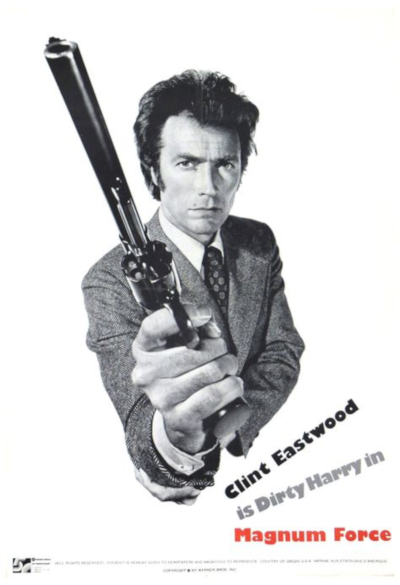
Magnum Force was
directed by Ted (Beneath the Planet of the Apes) Post, written by John
Milius and Michael Cimino and released in 1973. There were no plans
whatsoever to make a sequel to Dirty Harry but the box office returns
were very good and both Eastwood and the studio noticed that one of the
most frequent questions they encountered was the one asking them when
Harry Callahan was going to return to the cinema. A script entitled
Vigilante (and based on some plot threads that were unused in the Dirty
Harry screenplay) eventually became Magnum Force (gun nut John Milius
is credited with the change of title) and the resulting film was
successful enough in both critical and box office terms to ensure Harry
Callahan would definitely be back again in the future for a third
adventure.
Dirty Harry
director Don Siegel was unavailable for Magnum Force and although Ted
Post (who directed Eastwood in Hang 'Em High) is less inventive than
his predecessor he does a decent job and the film looks sleek with
Frank Stanley's Panavision-Technicolor lens. This is the best of the
four sequels to Dirty Harry and a satisfying and enjoyable thriller in
its own right. Some of the grittiness (I hate that word) and political
incorrectness of the first picture is washed away here and the central
conceit is a clever one. Callahan veered close to being a vigilante in
the first film so here they have him faced with a real group of
apparently well connected and organised vigilantes who are wreaking
havoc by murdering the criminal classes in San Francisco.
One would expect
Harry Callahan to have some sympathy with this development and not lose
too much sleep over a few gang bosses and murderers being wiped out but
he becomes the lone crusader for the law and has to defend the system
rather than fight it. As he reasons, until something better comes along
he has no choice but to defend the establishment. He has to play by the
rules this time and go after those who don't - the exact thing he has
always been accused of. It's a decent twist and seems like a reaction
to those who felt the character came off as too right wing and morally
dubious in the first film.
The
film starts with a fantastic Bond inspired gun fetish title sequence
that reprises Harry's famous amusing gambit to the stricken bank robber
in the first film. It soon transpires that San Francisco is in the grip
of a series of killings that threaten to put the courts out of
business. These are not the random killings of a serial killer though
but of the criminal fraternity. The victims are being chosen very
carefully. Mob bosses, even a pimp who killed one of his prostitutes.
The faceless killer we see at the start is dressed as a motorcycle
policeman and incredibly ruthless. These scenes are nicely done.
Harry (no
explanation for why he's got his job back after disobeying orders and
resigning at the end of the last film!) and new partner Early Smith
(Felton Perry) visit one of the crime scenes but have trouble with
their boss Lt Briggs (Hal Holbrook). Briggs absolutely loathes Callahan
and his methods and tries to keep him off the case. Our laconic hero
nevertheless soon becomes drawn into the investigation and realises
that the vigilante movement is much bigger and much more dangerous than
he had ever suspected. Magnum Force gives Eastwood another great
catchphrase ("A man has to know his limitations...") and is a very
solid and entertaining sequel on the whole. It's a difficult film to
review without giving everything away although you'll spot the twist
and the real villains very early on I would imagine.
There is a bit more
levity in this one and an acknowledgment of Dirty Harry as a character
who has become a cinematic icon already. I love the bit where Harry
responds to an airplane hijacking by walking out pretending to be the
pilot they requested and proceeds to judderingly career the plane
around the tarmac before dealing out some, er, Magnum justice to the
hijackers. "Excuse me, Captain. This may seem silly but can you fly?"
asks the bemused co-pilot. "Nope. Never had a lesson," replies
Eastwood. This is a funny sequence and if you take out the bloody gun
fight at the end is the sort of thing that Roger Moore would do in one
of his Bond films. Already the series is starting to become a slight
parody of itself but it's part of the fun I suppose.
They
soften the Eastwood character just a little and make him less aloof at
times. He even has a vague romantic interest in the form of his
neighbour Sunny (Adele Yoshioka). Eastwood owns the role by now and is
believably imposing and tough punching lights out and shooting people.
The extended climax where Callahan is being hunted (another reversal of
the first film) seems rather cliched now because we've had the old
shoot out/game of cat and mouse in an abandoned factory or docks a
billion times in subsequent police thrillers but it is nicely done here
and develops a decent amount of tension even if you are always aware
that they aren't going to kill Clint Eastwood. Not when there is
another Dirty Harry film to be made.
There is a good
cast for this one. Mitchell Ryan is excellent as Charlie McCoy, an
embittered and washed up motorcycle policeman and friend who Callahan
suspects might be involved in the vigilante killings. There are a host
of famous faces you'll probably recognise too in the police department.
David Soul, Tim Matheson and Robert Urich as rookie police officers who
impress Callahan with their prowess on the shooting range (good set
piece later where Harry competes in the western style police shooting
championship) and all stick together. David Soul was actually cast in
Starsky and Hutch on the back of Magnum Force when a television
producer saw him in the film.
Best of all is Hal
Holbrook as Callahan's boss Briggs - whom he is forced to work under by
the Captain. "Look, you work with Briggs on this, Callahan. But if you
ever lean out of line, so help me lord, I'll flop you low in whale
s***." Holbrook is a really good actor and his sparring with Eastwood
is always entertaining. Briggs is sardonic and a constant thorn to the
investigation as far as our hero is concerned. This is the longest of
the Dirty Harry films and goes on for over two hours but it never feels
as if it is unduly dragging while you are watching it. I like Magnum
Force and think this is a good sequel. Not as stylish as the first film
but certainly good old fashioned violent fun.
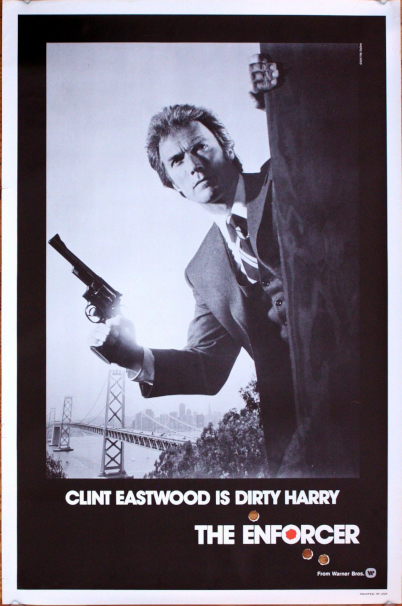
While Magnum Force
was probably as good as a sequel to Dirty Harry had any right to be the
series was never quite as strong thereafter and got as far as it did
coasting on the grumpy charisma of its famous leading man. The Enforcer
was released in 1976 and while it has its moments it often feels like a
pale imitation and blending of the first two films. It reminds me of
Jaws 2 in many ways. A decent enough film but like a pale Karaoke
version of what came before. Something is always missing. Eastwood had
intended to direct the third Dirty Harry film himself but when he
replaced Phillip Kaufman on The Outlaw Josey Wales he didn't have
sufficient time and gave the job to his assistant director James Fargo.
The Enforcer looks ok but simply lacks the polish and flair of the
first two pictures.
One can detect the
hand of Eastwood from behind the camera at points (it is believed that
he directed some bits of the The Enforcer and a few years before had
actually directed the rooftop jumper scene in Dirty Harry when Siegel
was ill that day) but the film seems to lack energy at times and is
saddled with a weak and fairly ludicrous story that is credited to
Stirling Silliphant and Dean Reisner (who were apparently working from
a premise given to Eastwood by two young screenwriters who were big
Dirty Harry fans).
The Enforcer begins
with what by now has become almost a comic staple of the films.
Callahan annoying his boss by foiling some sort of criminal scheme (he
stumbles into by accident) in violent cartoon Frank Drebin fashion.
When a hostage situation arises at a liquor store and the crooks demand
a vehicle, Harry obliges and drives his car straight through the glass
before shooting everyone. "You took out two front doors, one front
window, 12 feet of counter, plus damages to the stock, plus one city
vehicle totaled, not to mention three hostages in the hospital, all of
whom will probably sue the city!" booms his new boss Captain Jerome
McKay (Bradford Dillman). "For your information, Callahan, the minority
community has just about had it with this kind of police work." Our
hero is none too pleased to hear he is being transferred from Homicide
to Personnel. "Personnel? That's for assholes!" The relationship
between Harry and his bosses is sort of becoming like Inspector
Clouseau and Chief Dreyfuss from the Pink Panther films by this stage.
Anyway, Harry's
unorthodox but effective methods are required again when a terrorist
group known as the People's Revolutionary Strike Force (PRSF) suddenly
rear their head and start causing trouble. As if that wasn't bad enough
they appear to be hippies. Hippy terrorists! They are led by Bobby
Maxwell (DeVeren Bookwalter) - a man who looks more like a drug addled
surfer than a militant leader - and kill two gas men and assume their
identities for financial gain. Killing two gas men isn't exactly Ernst
Stavro Blofeld on the mountain peak of villainy but they have much
bigger plans involving the kidnapping of the Mayor and the theft of
heavy weapons including M72 LAW rockets.
You can probably
guess that it will be up to Harry to stop them but he has another
partner to deal with now as they all keep being killed. If you want a
long life then you should avoid becoming Harry Callahan's partner at
all costs. It's like people who marry Charles Bronson in the Death Wish
films. You are toast. Because of an affirmative action programme at the
police department Harry is none too pleased to learn that his new
partner is rookie Kate Moore (Tyne Daly). Female police officers. I ask
you. What is the world coming to? They'll want the vote next. It won't
come as a huge surprise though to learn that Kate gradually begins to
win the respect of our sexist hero and there is a little fission of
attraction too. It will be up to Harry and Kate to somehow put a
spanner in the best laid plans of these hippy rascals.
The sliding scale
of political correctness has retracted somewhat with The Enforcer on
about eight million levels. The Enforcer is certainly watchable and
probably better than the two eighties entries in the series (somehow
Harry Callahan just works better as a piece of seventies memorabilia)
but it does have some salient weaknesses. The supporting cast is
largely unmemorable and DeVeren Bookwalter hams it up to no great
effect as the villain. Although they do some nasty stuff the People's
Revolutionary Strike Force always seem very cardboard and cartoonish
and don't linger in the memory for very long after you've seen the
film. My abiding memory of The Enforcer is the fact that Harry Callahan
uses a rocket launcher at the end. That's worth the price of admission
alone!
The big saving
grace of the cast and perhaps even the film is Tyne Daly as Harry's new
female partner. Daly later became famous for her part in the police
series Cagney & Lacey and she's really good here. Scared and
eager to impress but tough and a character you believe in. Daly is a
good actress. If they made a film like this now Kate Moore would be
played by some blonde teenage bimbo from Riverdale or something but
Daly feels like a real person.
This is one of the
shortest of the Dirty Harry films despite the fact that some chase
sequences seem to go on for an awfully long time. One of these in
particular is pretty good. A pounding foot chase that makes good use of
the (ahem) streets of San Francisco. The moment though where a chase
and punch up ends up disrupting what appears to be the set of an adult
film is a bit strange. Substitute them for something else and Clint
could be Roger Moore in a Bond film again. You sense here that someone
(and by someone I obviously mean Clint Eastwood) decided to make the
film leaner in the editing room and up the action quotient at the
expense of exposition and too much talky stuff. It works at times but
The Enforcer ultimately feels like a relatively entertaining but hollow
film compared to the first two. So you get some action sections that go
on too long and no real subtext or depth to the picture.
The hippy terrorist
group are never really explained or developed much. Who are they
fighting for? Do they want political change or money? We are never
completely sure. One other thing that is noticeable is that Lalo
Schifrin has been replaced by Jerry Fielding (for one film only though)
and the jazzy music isn't quite the same. Eastwood seems a bit bored in
this one but always has gruff charisma to spare. This is worth sticking
through though for him, Tyne Daly and the climax in the dilapidated
ruins on Alcatraz Island. The Enforcer is not bad but feels a trifle
lightweight and uninspired after the first two. One quibble I do have
with The Enforcer resides in the catchphrase department. This is the
only film that doesn't give him a classic new one. All he does is utter
"marvelous" under his breath a lot!
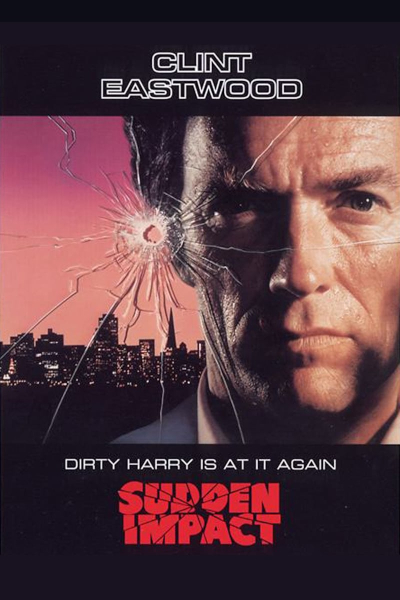
The Enforcer was
always intended to be the last film in the Dirty Harry series and it
seemed like a decent idea to leave our shoot first worry about
questions later hero in the seventies as part of a trilogy. However,
when 53 year-old Sean Connery made an unexpected return to the role of
James Bond in the renegade 007 film Never Say Never Again, Warner
Brothers conducted a poll to ask cinema goers which other famous
characters they would like to see resurrected again. The response
indicated that the public were very keen on seeing Clint Eastwood play
Harry Callahan once more so, seven years after The Enforcer, Dirty
Harry was at it again in 1983's Sudden Impact.
The film (written
by Joseph Stinson) is the only Dirty Harry entry to be directed by
Eastwood himself and he makes it much more film noir with flashbacks
and shadows constantly looming on walls and night locations. The story
actually seems to do a 180 degree spin on the events of Magnum Force
where Callahan condemned organised vigilantism and had to fight against
it. Here, he seems to have no problem with taking the law into his own
hands and murder so long as the targets are complete scumbags. Morally
it's a murky story and an unpleasant one too at times but tempered by
plenty of humour and tongue-in-cheek action. The film begins by showing
us the vigilante/murderer Columbo style straight away. There is no
great mystery to unravel. Jennifer Spencer (Sandra Locke) is an artist
who - along with her sister - was brutally raped ten years ago by a
group of men (and one lesbian). Her sister never recovered and is now
catatonic.
Spencer has begun
killing the perpetrators one by one using the same method of shooting.
As the police investigation gathers pace, she moves to the quiet beach
town of San Paulo to lay low and restore the boardwalk's historic
carousel (where the rape took place). Meanwhile, Inspector Harry
Callahan is up to his usual antics. He foils a robbery at a diner in
his usual fashion ("Go ahead, make my day!") and gatecrashes a family
wedding party and causes a crime boss to have a heart attack when he
accuses him of murder. As ever, Harry's boss - Lt Donnelly (Michael
Currie) - is not too impressed. "What in God's name were you doing at
that restaurant last night? Harassing the suspects again? Giving
someone a heart attack? Harry, as of right now you are going to take a
vacation. That's final!"
Although he
apparently never takes holidays, Harry is ordered to disappear and go
and cool off somewhere. He winds up in San Paulo (how convenient!)
where he strikes up a friendship/romance with Jennifer Spencer but soon
begins to notice that murders there match of the modus operandi (".38
caliber vasectomy") of the San Francisco case. Oh, and hired goons
connected to the crime boss he made have a heart attack are constantly
out to kill him!
Eastwood was
knocking on a bit by now but is still a commanding presence as Dirty
Harry and slips back into the character fairly easily. We quickly
gather he's still the same old Harry Callahan when he is left seething
at what he perceives to be another yoghurt knitting court decision at
the start of the film and lets the recipient of this legal generosity
know exactly how he feels. "Listen, punk. To me you're nothin' but
dogs***, you understand? And a lot of things can happen to dogs***. It
can be scraped up with a shovel off the ground. It can dry up and blow
away in the wind. Or it can be stepped on and squashed. So take my
advice and be careful!"
The character
actually seems more right wing than ever here after his establishment
heroics in the second film and flickers of humanity in the third. The
actual killing vignettes of the murderess are shot in stark fashion and
quite unpleasant, even slightly unsettling. This is the closest the
series comes to Death Wish territory and asks the question of what
Harry Callahan would do if he encountered a Charles Bronson (as Paul
Kersey) type vigilante.
The answer here is
that he would have sympathy - despite the fact that in Magnum Force he
wasn't prepared to stand by and let crime bosses and such like be
murdered by vigilante activity. I suppose one could argue that some
innocent victims did or could get caught up in the fray in Magnum
Force. While I found elements of Sudden Impact distasteful it is
generally an entertaining picture if a trifle pretentious at times in
the manner that Eastwood shoots the film. The seventies grittiness has
since evaporated and this is more generic than earlier films. An action
mystery caper that just happens to have Clint Eastwood walking around
dispensing sarcastic quips and blowing people away at the centre of it
all.
The violence of the
series continues but there are some moments of levity that are probably
needed I think - although they do veer into parody. Harry commandeers a
tour bus full of pensioners to chase a bank robber. You couldn't
imagine a comic scene like this in the first film. Or him being saddled
with a pet bulldog. Harry constantly fending off the attempts by the
goons connected to the crime boss to kill him sometimes smack of Carrie
Fisher trying to kill John Belushi in The Blues Brothers but they are
fun and supply some good action sequences.
Eastwood dealing
with the punks in the diner at the start though is classic Harry
Callahan. "Every day for the past ten years, Loretta here's been giving
me a large black coffee - except today she gives me a large black
coffee and it has sugar in it. A lotta sugar. I just came back to
complain..." Sandra Locke is pretty bland as the female lead though and
clearly only got the part because she was living with Eastwood (she was
in most of his films in this era).
I suppose one of
the interesting things about the film is the way it moves the action
(for the most part) away from San Francisco in an attempt to do
something new. It works relatively well and Harry still has an
authority figure to lock horns with in the form of Pat Hingle's local
Police Chief Lester Jannings - a man in no mood to let some big city
hot shot come in and start meddling in San Paulo police business. You
will probably spot some of the twists in the film coming a mile off but
there is just enough wit in the script and enough violent Dirty Harry
action to make this worth your time if you've watched the other films.
Sudden Impact is not an especially good film but it has its moments.
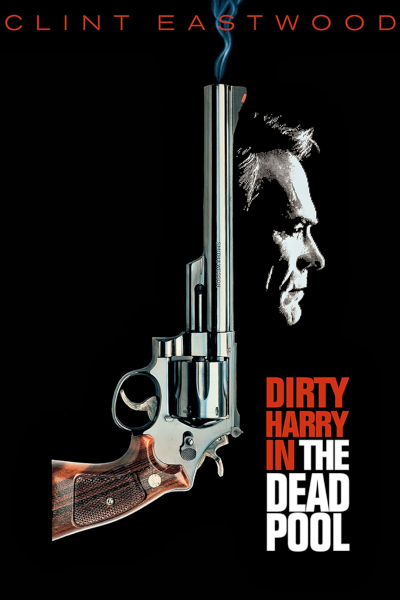
Last and least, we
have 1988's The Dead Pool, by far the most superficial, insubstantial,
generic and unnecessary film in the series but just about worth
watching for Eastwood alone. He's in his sixties by now but still has
attitude. "**** with me, buddy, I'll kick your ass so hard you'll have
to unbutton your collar to s***!" Eastwood handed over the director's
chair to his friend and former stunt double Buddy Van Horn so you get
the impression he wasn't taking this one very seriously and was maybe
doing one last Harry Callahan caper as a favour to the studio to get
some more cherished and uncommercial projects green lit. Buddy Van Horn
was best known for directing Eastwood in the comedy Any Which Way You
Can (the one with the orangutan) so he wasn't exactly Steven Spielberg.
The story (by
someone named Steve Sharon) is pretty silly and jarringly brings the
character firmly into the eighties. There is no controversial political
subtext to this entry and it merely unfolds as a fairly run of the mill
thriller/action film that with one or two tweaks probably could have
been fashioned into a Chuck Norris vehicle. The film starts with Harry
now something of a celebrity after putting away crime boss Lou Janero
(Anthony Charnota) and ending up on the cover of the city magazine.
Just as in Sudden Impact, the mobster's men seek to extract revenge by
trying to kill him. Hey, come up with a few new plot threads!
Harry and his new
partner, the kung fu kicking martial arts expert Al Quan (Evan C Kim),
are assigned an unusual case. A rock star named Johnny Squares (played
wih a large dose of ham by a young Jim Carrey billed as James Carrey)
has been found dead in his trailer during the production of a horror
film directed by Peter Swan (Liam Neeson). When a producer of the film
is later killed, Harry discovers that he and Swan were playing a game
known as the Dead Pool which involves guessing which celebrities will
die next. Squares and Callahan himself are on the Dead Pool list and
when more people start being killed it becomes obvious that someone is
taking this game very seriously.
This is a strange
entry in the series and by far the shortest film. It is almost sending
itself up by this point but I suppose the Dirty Harry character and
series had been lampooned and mimicked so many times by now there
wasn't much else to do. By now a new generation of action stars led by
Arnold Schwarzenegger had long since supplanted Eastwood as Hollywood's
premier tough man but he shows here that a steely glare is just as
effective as muscles. Harry seems a tad more benign though in his
dealings with his superiors and it almost seems as if they have started
to appreciate him at last. His boss Captain Donnelly (Michael Currie)
though is still not completely happy with his James Bond penchant for
property damage. "13,453 dollars and 63 cents. That's how much an
unmarked squad car costs this department. That's the third goddamned
car you trashed this month!"
After smashing a
press camera, Harry has to talk to journalist Samantha Walker (Patricia
Clarkson) to balance the investigation and a romance develops. The
character is more human here again although he does of course still
swear a lot and shoot people. Catchphrases are a bit thin on the ground
here ("You're s*** out of luck" isn't the greatest) but I did like
Harry visiting Janero in prison and telling him that if he doesn't call
the goon squad off then he'll get the prison's most notorious nutcase
to "cancel his ass like a stamp". What a wonderful turn of phrase!
Patricia Clarkson is probably needed here as the acting from the
supporting cast isn't great. Liam Neeson is positively awful with a
dreadful English accent and "James" Carrey isn't much better, not that
he's in the film for long.
Eastwood gets a few
good lines ("Maybe I'll start my own dead pool, and put you on it...")
in his scenes with Neeson but the screenplay is fairly ordinary and
never feels like a great fit for the character. Evan C Kim is Jackie
Chan-lite as Harry's new partner and seems like a contrived attempt to
give the film more modern appeal and be more down with the kids of
1988. The rock music (Guns and Roses make a cameo) and horror film
trappings (some might enjoy the horror angle as a change I suppose) are
incredibly dated now and it seems somewhat incongruous to see such an
icon of the seventies walking around in this pop video environment.
The direction by
Buddy Van Horn is very run of the mill and this easily the least
interesting of the five films to look at. The most memorable sequence
in the film is certainly the car chase where Harry careers his
Oldsmobile 98 squad car around the bumpy hilled roads and streets of
San Francisco pursued by remote control toy car that has a bomb
strapped to it! This is a preposterous sequence that owes a lot to
Steve McQueen's Bullitt but it is fun.
The Dead Pool is an
average police thriller that often seems indistinguishable from other
Eastwood action films around this time (The Rookie etc) and definitely
lacks the Harry Callahan residue of the first three films (and even
Sudden Impact). It's sort of fun though in a comic book way at times
and Eastwood's grizzled last turn as his most famous character is not
bad at all. He's sort of like Sean Connery in Never Say Never Again
here. The two films aren't exactly brilliant but it was nice all the
same to see Eastwood and Connery in their most famous roles one last
time.
- Jake
© 2021
Alternative 007
|

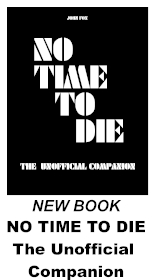
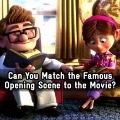
|






